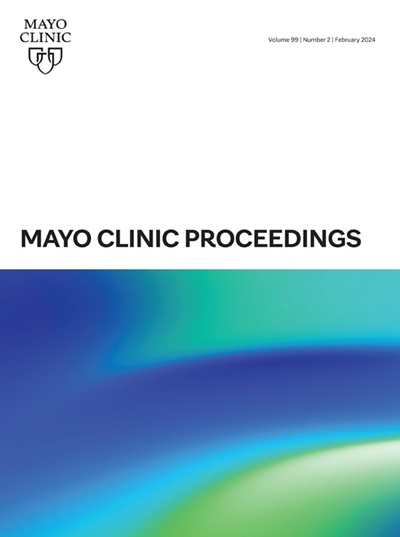美国心脏病学会/美国心脏协会心衰分期系统强调转甲状腺素型心脏淀粉样变性的诊断延迟和预测结果。
IF 6.7
2区 医学
Q1 MEDICINE, GENERAL & INTERNAL
引用次数: 0
摘要
目的:应用美国心脏病学会(ACC)和美国心脏协会(AHA)心衰(HF)分期系统评估甲状腺素型心脏淀粉样变性(TTR-CA)患者的诊断延迟和预后。患者和方法:在意大利注册的TTR-CA连续患者根据诊断时的ACC/AHA HF分期系统进行分类。结果评估为3年随访期间的全因死亡率。结果:在诊断时,549例trr - ca患者中,115例(20.9%)为HF B期,172例(31.3%)为C1期,198例(36.1%)为C2期,64例(11.7%)为D期。B期、C1期、C2期和D期患者的左室收缩功能障碍、晚期舒张功能障碍、晚期纽约心脏协会功能分级、因HF住院和n端前B型利钠肽值的发生率依次较高。3年时,B期HF患者的生存率为94%,C1期为69%,C2期为43%,D期为17%。在多变量分析中,以B期为参照,C1期、C2期和D期全因死亡率的风险分别增加了4,5和11。结论:在诊断时,几乎一半的TTR-CA患者出现晚期HF (C2或D),这表明明显的诊断延迟。ACC/AHA HF分期系统可准确地对预后进行分层,并可有效地添加到TTR-CA患者的多参数评估中。本文章由计算机程序翻译,如有差异,请以英文原文为准。
The American College of Cardology/American Heart Association Heart Failure Staging System Highlights Diagnostic Delay and Predicts Outcome in Transthyretin Cardiac Amyloidosis
Objective
To apply the American College of Cardiology (ACC) and American Heart Association (AHA) heart failure (HF) staging system to patients with transthyretin cardiac amyloidosis (TTR-CA) in order to assess diagnostic delay and evaluate prognosis.
Patients and Methods
Consecutive patients with TTR-CA enrolled in an Italian registry were classified according to the ACC/AHA HF staging system at diagnosis. Outcome was assessed as all-cause mortality during a 3-year follow-up.
Results
At diagnosis, of 549 patients with TTR-CA, 115 (20.9%) presented with HF stage B, 172 (31.3%) with stage C1, 198 (36.1%) with stage C2, and 64 (11.7%) with stage D. Patients with stages B, C1, C2, and D presented with hierarchically higher prevalence of left ventricular systolic impairment, advanced diastolic dysfunction, advanced New York Heart Association functional class, hospitalization for HF, and N-terminal pro–B-type natriuretic peptide values. At 3 years, the survival rate was 94% in patients with stage B HF, decreasing to 69% with stage C1, 43% with stage C2, and 17% with stage D. At multivariable analysis, considering stage B as the reference, risk increase for all-cause mortality was 4, 5, and 11 for stages C1, C2, and D, respectively.
Conclusion
At diagnosis, almost half of patients with TTR-CA present with advanced stages of HF (C2 or D), suggesting marked diagnostic delay. The ACC/AHA HF staging system accurately stratifies prognosis and may be usefully added to the multiparametric evaluation of patients with TTR-CA.
求助全文
通过发布文献求助,成功后即可免费获取论文全文。
去求助
来源期刊

Mayo Clinic proceedings
医学-医学:内科
CiteScore
16.80
自引率
1.10%
发文量
383
审稿时长
37 days
期刊介绍:
Mayo Clinic Proceedings is a premier peer-reviewed clinical journal in general medicine. Sponsored by Mayo Clinic, it is one of the most widely read and highly cited scientific publications for physicians. Since 1926, Mayo Clinic Proceedings has continuously published articles that focus on clinical medicine and support the professional and educational needs of its readers. The journal welcomes submissions from authors worldwide and includes Nobel-prize-winning research in its content. With an Impact Factor of 8.9, Mayo Clinic Proceedings is ranked #20 out of 167 journals in the Medicine, General and Internal category, placing it in the top 12% of these journals. It invites manuscripts on clinical and laboratory medicine, health care policy and economics, medical education and ethics, and related topics.
 求助内容:
求助内容: 应助结果提醒方式:
应助结果提醒方式:


